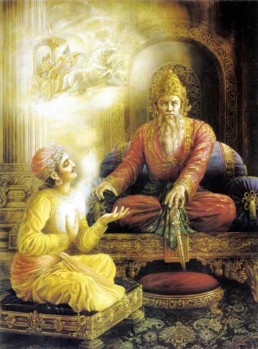Swami Chinmayananda Commentary
Just as a story-teller comes to add new details each time he narrates the same old story, so too, Arjuna seems to draw new inspiration from his foolishness, and each time his creative intelligence puts forth fresh arguments in support of his wrong philosophy. As soon as he finishes a stanza, he gets, as it were, a new lease of arguments to prattle, and takes refuge behind their noise.
He indicates here that, when individual families are destroyed, along with them the religious traditions of the society will also end, and soon an era of impiety will be ushered in.
Cultural experiments were the pre-occupations of our fore-fathers and they knew that the culture and tradition of each family was a unit of the total culture and integrity of the whole nation. Hence the important of the family-Dharma so seriously brought forth by Arjuna as an argument against this civil war.
Adi Sankara Commentary
Sri Sankaracharya did not comment on this sloka. The commentary starts from 2.10.
The Bhagavad Gita with the commentary of Sri Sankaracharya – Translated by Alladi Mahadeva Sastry
Holy Geeta – Commentary by Swami Chinmayananda
The Bhagavad Gita by Eknath Easwaran – Best selling translation of the Bhagavad Gita
The Bhagavad Gita – Translation and Commentary by Swami Sivananda
Bhagavad Gita – Translation and Commentary by Bhaktivedanta Swami Prabupadha
Srimad Bhagavad Gita Chapter 1 – Verse 40 – 1.40 kula-kshaye pranashyanti – All Bhagavad Gita (Geeta) Verses in Sanskrit, English, Transliteration, Word Meaning, Translation, Audio, Shankara Bhashya, Adi Sankaracharya Commentary and Links to Videos by Swami Chinmayananda and others – 1-40

